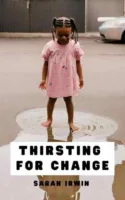Facing the ultimate challenge of our times, South Africa’s youth must lead the charge against the climate crisis and shape our future. As our country’s future leaders and workforce, it is essential to realise that South Africa is not only one of the most vulnerable countries to climate change but is affecting our country right now. This is not a futuristic or hypothetical problem. Climate change is an ongoing problem that will exponentially worsen if not addressed. I want to address the water crisis in South Africa in this blog post as I feel that many South Africans are not making the connection between current ecological disasters and climate change.
The problem
Many of you living in the Western Cape will remember the water crisis of 2017. Severe drought had meant the dreaded “day zero” was fast approaching. I can distinctly remember the water regulations, collecting water from springs, and how the drought meant I switched from bathing to showering (and have not looked back since, I might add). However, many of you may not know that water issues continue to affect South Africa, and many of them affect communities that are not as vocal about the inconvenience of not being allowed to use their swimming pool during the hot summer months.
In the Limpopo province, a study conducted in 2020 highlighted how many local communities use the Mutale River’s water for household consumption. However, drought, changes in rainfall patterns, and increased temperature patterns have caused the water levels in the river to decline, resulting in an unsustainable water supply. On the converse, in 2022, Durban, KwaZulu-Natal- Natal was affected by extreme flooding, and it is thought to be the most devastating natural disaster the province has faced since as far back as the 1840s.
These natural disasters are just the tip of the iceberg. Water security is a significant concern for our country as we rely heavily on rainfall to fill our dams. With changing weather patterns due to climate change, South Africa has experienced record low rainfall and high temperatures since 2015. We are one of the driest countries in the world, and this will only worsen with changing weather patterns. Further, a rising population means our strained water systems are under increased pressure. Cape Town alone has grown by 79% between 1995 and 2018 and is expected to continue to grow. With a decreased water availability, our agriculture sector is threatened- threatening food security. “The climate crisis is affecting our water availability now,” says Daniel (20, Chemical Engineering student), “further, it is disproportionally affecting vulnerable communities in our country. There will always be a solution for those with money, but what about those who don’t?”
A twofold problem
While climate change has undoubtedly affected our water security, it is also important to note that this is only half the story. A lack of investment towards increased water infrastructure and technology has meant that water accessibility is difficult and dangerous. In 2023, Northern Gauteng experienced a cholera outbreak due to the pollution of water sources in the area due to the neglect of the upkeep of the sewage system. Many rural populations need access to water due to a lack of infrastructure investment to provide these populations with a consistent water supply.
A possible solution
Solving the water crisis in South Africa demands a comprehensive and concerted effort, and it begins with us, the youth, the architects of tomorrow. Our involvement is not just a choice but a necessity. Casting our votes in the upcoming elections is a pivotal first step, but it’s only the beginning. We must scrutinise the environmental policies of our candidates, ensuring that they have actionable plans to tackle climate change and address the disparities in water access and security that disproportionately affect our country.
The journey towards water security extends beyond the ballot box. We must advocate for systemic change confronting the deep-seated geospatial and economic inequalities plaguing our water distribution systems. Conservation efforts must be more than just an aspiration; they should become a way of life for every South African. Every drop saved contributes to the resilience of our communities.
Supporting non-profit organisations like One Drop can amplify our impact, providing critical resources and expertise to ensure safe water access for all. However, our commitment must go further. Engaging in local initiatives, educating those around us about the importance of water conservation, and adopting sustainable practices in our daily lives are all steps we can take to forge a future where water insecurity is a thing of the past.
Water security is a fundamental human right and the foundation upon which we will build a more equitable, sustainable, and thriving South Africa. Let us unite in this cause as participants and leaders in the fight against water injustice. For the sake of both our present and our future, we must be relentless in our pursuit of change, understanding that every action we take is a ripple that can swell into a tidal wave of transformation.
What role can digital platforms, social media, and tech-based solutions play in fostering community engagement, enhancing water conservation efforts, and ensuring equitable water distribution across diverse socio-economic landscapes?



